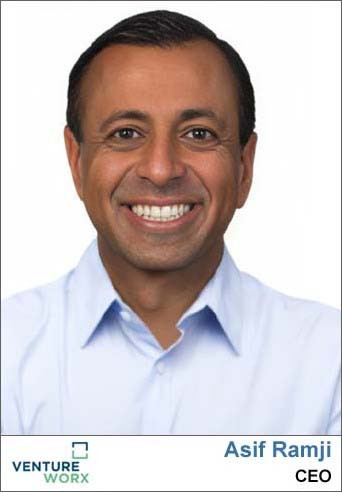
When Asif Ramji became CEO of Atlanta based Paymetric in 2011, he knew that he had a big task in front of him. Struggling financially, the company was then losing money. “We had to turn things around quickly,” he says, “or the company would face severe challenges.” By moving to a Saas model and focusing on sales, Asif was able to attract Francisco Partners to make a majority investment in the company in August of 2013. Three and a half years later, the sale of Paymetric to Vantiv for $550 million yielded Francisco a 7 X return on investment and started Asif Ramji on an entrepreneurial hot streak that continues to this day.
In over a dozen transactions since, Asif and his team have returned billions of dollars in shareholder value, have over $50 Billion of direct mergers and acquisitions experience and have been ridiculously successful by any measure. Now working through his company Venture Worx, Asif is primarily an investor and advisor, serving on a number of fintech boards and frequently advising or leading merger and acquisition transactions.
Below are transactions that Asif has engaged in as executive, chairman, CEO or board member over the last 10 years:
Sale from To Sale Price Year
Paymetric/Vantiv $550 million 2017
Vantiv/WorldPay $11.3 billion 2018
WorldPay/FIS $43 billion 2019
State Bank & Trust/Cadence $1.5 billion 2019
Patientco/Waystar $455 million 2021
Cartica Acquisition Corporation $200 million (IPO) 2022
Stax/Greater Sum Ventures $1 billion 2022
BlankFactor/Globant $500 million 2024
Itel/Nearmap Toma Bravo $1.3 billion 2025
AvidXchange/TPG & Corpay $2.2 billion 2025
When this remarkable string of transactions began, Asif continued to work in high level operational roles. After the sale of Paymetric, for example, Vantiv, CEO Charles Drucker asked Asif to join his executive team. These executive roles continued through the merger of Vantiv with Worldpay as well as the sale of Worldpay to FIS. After serving in the c suite of FIS for two years, and completing the Worldpay earn out, Asif left traditional corporate America. In 2021 he formally began his investor and advisory services role working through his company, Venture Worx.
At Venture Worx, Asif partners with a number of private equity funds to drive value creation strategies. “Working with great people makes a huge difference in the level of success,” he says. “I’m fortunate that I get to work with smart people at some of the industry’s top private equity firms. Combining their investing experience with my operational experience has worked extremely well for both of us.” Asif believes the insights and experience he has gained from over 25 years of operational experience have definitely helped him as an investor.
Asif has served on over a dozen for-profit boards of fintech companies and has found the transition to board work very rewarding. “I usually serve as chairman or as a lead director. I try not to go too deep into the weeds most of the time, but I can go deep when necessary.”
Highly involved in many profitable exits, Asif says that it’s all about the team. “Repetitive success requires persistence and teamwork. Great CEOs lead the business and great boards support those teams,” he says. “I stay engaged and add value when and where needed. I’m involved strategically, supporting the executives to make the right decisions.”
Asif believes the financial opportunities in payments, commerce enablement and streamlining workflows of payment services will only continue. He and his investment partners look for great CEOs and management teams with companies that are strong financially. “We ideally invest in companies that balance profitability with growth,” he says.
“I use a co-invest model where I typically serve as an independent director and help the company deliver on its value creation strategy.” His knowledge and experience across financial services technology and scaling the operational functions of growing businesses are invaluable to his co-investors. Indeed, these funds respect Asif’s judgment and are happy to partner with him.“I’m grateful to partner with some of the industry’s top investment funds,” he says.
More recently, Asif and his partners launched Payteros, a trusted deployment partner for leading financial technology providers and enterprise clients. “The company has deep domain knowledge in commerce enablement, payment workflows, and ERP integration with a proprietary implementation methodology and AI-powered accelerators,” he says. “It’s a lot to say, I know, but their work supports some of the world’s largest companies by helping them reduce transaction costs, streamline operations, and improve security. I believe they have a great future.”
Asif is also chairman of Worth AI, an onboarding and underwriting workflow automation platform which streamlines operations with platform consolidation for faster approvals, enhanced compliance, and smarter risk management. “I believe this company can revolutionize business credit scoring and risk management with AI,” he says.
A previous winner of the Ernst & Young Entrepreneur of the Year for Financial Services, Asif currently serves as chairman of the EY World Entrepreneur of the Year judging committee, which he attended in Monaco in June of this year. Asif also serves as chairman of the Atlanta CEO Council, an organization created to support the entrepreneurial ecosystem in the greater Atlanta area. Giving back to the community where we work and live is an important responsibility and supporting entrepreneurship globally is equally as important.
Given all his success, Asif makes time to give back. He is passionate about the organizations he supports, which includes his service on the board of Children’s Healthcare of Atlanta. Asif is chairman of the hospital’s investment committee. “We strive to make sure that the children in the hospital have the resources they need for generations to come,” he says. This year Children’s Healthcare of Atlanta opened a new world class hospital leveraging the latest technology and advanced treatments to support the health and well being of children in the region and beyond.